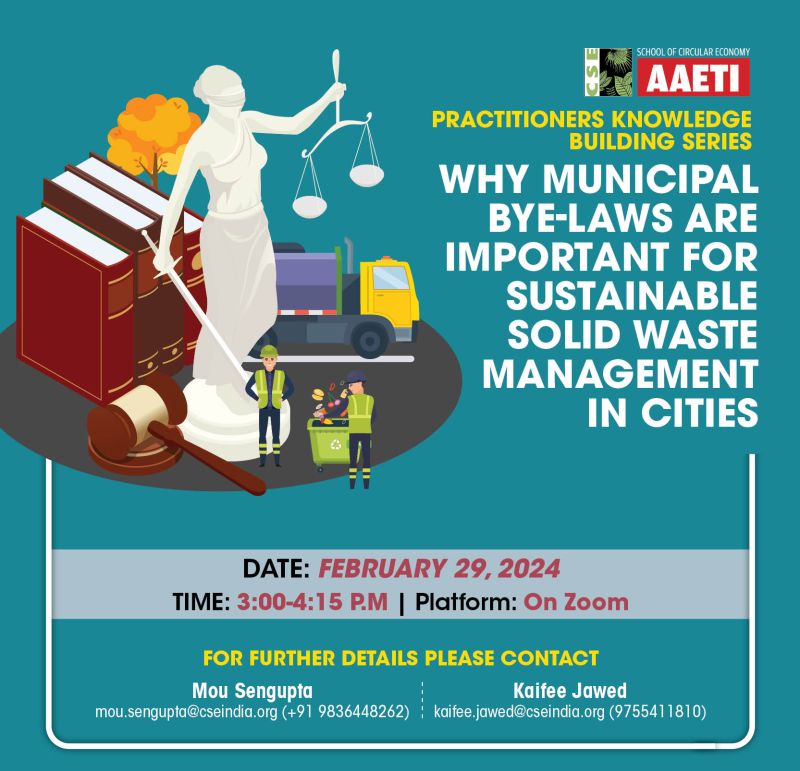Why Municipal Bye-Laws are Important for Sustainable Solid Waste Management in Cities: CSE

![]()
Date: Feb 29, 2024 | Time: 3 PM IST | Zoom
The Centre for Science and Environment (CSE) is a public interest research and advocacy organisation based in New Delhi. CSE researches into, lobbies for and communicates the urgency of development that is both sustainable and equitable. The scenario today demands using knowledge to bring about change. In other words, working India’s democracy. This is what we aim to do. The challenge, we see, is two-pronged. On the one hand, millions live within a biomass based subsistence economy, at the margins of survival. The environment is their only natural asset. But a degraded environment means stress on land, water and forest resources for survival. It means increasing destitution and poverty. Here, opportunity to bring about change is enormous. But it will need a commitment to reform – structural reform- in the way we do business with local communities. On the other hand, rapid industrialization is throwing up new problems: growing toxification and a costly disease burden. The answers will be in reinventing the growth model of the Western world for ourselves, so that we can leapfrog technology choices and find new ways of building wealth that will not cost us the earth. Our aim is to raise these concerns, participate in seeking answers and in pushing for answers, transforming these into policy and so practice. We do this through our research and by communicating our understanding through our publications.
Municipal bye-laws for solid waste management (SWM) constitute an essential regulatory framework that can encompass all aspects of SWM — from its generation to final disposal, covering collection, transportation, storing, processing, disposal, monitoring and regulations. They also empower local governments to impose penal provisions in case of non-compliance and violation.
The Solid Waste Management (SWM) Rules, 2016 mandate all urban local authorities, village panchayats, census towns and urban agglomerations to frame bye-laws incorporating the provisions of SWM, 2016 within one year from the date of notification and ensure timely implementation. The Rules also say that these local entities should make/amend a bye-law for SWM to be able to provide necessary services to citizens, levy taxes or fines, and collect user fees whenever and wherever deemed necessary.
Thus, a municipal bye-law is the strongest legal instrument at the disposal of local governments to enforce sustainability measures while fulfilling their own responsibilities. But in today’s context, the efficacy of such bye-laws needs to be sharpened to bridge the gap between policy and practice for stopping as much waste as possible from going to landfills.
How can such bye-laws be effectively used to institute sustainable waste management systems? How can they be turned into legal instruments to bridge the gap? What are the interventions that are required? CSE next webinar in the Practitioners Knowledge Building Series aims to discuss and explore answers to all these questions and more – do join our experts for a deep dive into the subject of municipal SWM bye-laws.
NOTE: This webinar is free for everyone. It is a learning opportunity to waste management practitioners, officials from Central and state urban departments and municipalities, urban and town planners, NGO representatives, CBOs, and anyone interested in the subject. All those who register will receive an automatic confirmation.
However, we request you to register yourself at the earliest and reach out to us in case of any queries. No certificates will be provided.
For further details please contact:

